Behind the poetic name of Derrière Le Miroir, we can find a German “sensitive wave-pop” trio that recorded three fabulous albums in the nineties. After more than ten years apart, the band returned “as a birthday present” and released a new album in 2016. We have talked to Ralf Jesek, one of the voices of the band and guitarist, as well as a member of In My Rosary. They will be playing at the Ombra Festival that is going to be held in Barcelona on December 1st, celebrating thirty years since their first album.
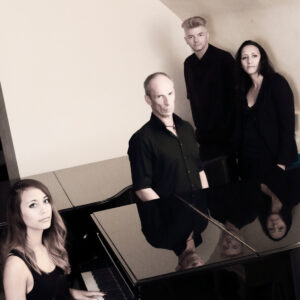 —Is the name of the band a reference to the classic French art magazine or just to the Lewis Carroll’s book? Why did you choose such a name?
—Is the name of the band a reference to the classic French art magazine or just to the Lewis Carroll’s book? Why did you choose such a name?
—Ralf: We didn’t know the art magazine at all when we chose the name. It was purely inspired by Lewis Carroll’s book and since we thought an English name would be too ordinary, we took a French one.
—The roots of Derrière Le Miroir laid in a school band called T.H.E where Kai and Ralf used to play in their youth. The first songs recorded were in 1985. What can you please tell us of your first days making music? You both already met in school, right?
—Yes, Kai and I know each other from school. Our first musical attempts were a short-lived 4-piece school band that tried their hand at German pop (it was the time when NDW, the German New Wave, was still a bit popular). And in the mid 1980s we both developed a love for bands like The Cure, Fad Gadget, Sad Lovers & Giants etc. and decided to try something similar. We had guitar and bass, borrowed a rhythm machine and a keyboard and went to a small basement studio for a day to record a demo with four songs. A producer from Cologne was interested in one of them, but Kai decided against working with him. So, I recorded the track “Claudine” in Cologne with two members of a friendly punk band – only to find out that Kai’s decision had been the right one: the result was really disappointing. But out of the studio line-up came my first real band called Example A.
—The following band with Kai and Ralf was Drowning Voices in the Crowd, that only appeared in some compilations, wasn’t it? I guess it was a bit less amateur. Musically, was there any change from a project to another?
—Yes, apart from 2 demo cassettes we were only involved in a few compilations. We were a typical regional band that mainly played in the local area. Musically, it was – at least for us – a kind of guitar pop with New Wave and Britpunk applications. Less dark and with real drums!
—When did you start Derrière Le Miroir? There is a compilation called Selected 1992-1995 but also a cassette called Deavant Le Mots from 1991. Were you in Drowing Voices in the Crowd at the same time that in Derrière le Miroir, right? Was DLM a cause of the end of Drowing Voices?
—When Kai and I were waiting in the rehearsal room for the others of Drowing Voices, we just programmed a drum pattern and improvised a bit with guitar, bass and voice. Out of that came the idea to revive T-HE and we started to try out a few things before the band rehearsals. At some point, Kai came up with the idea of a female singer and suggested Nicole, with whom he had been friends for a while. But it was all absolutely loose, we really weren’t thinking about a real band. Only after we had recorded a demo and it was well received, we decided to make a real band out of it. Which was in 1992. And yes, D/L/M had its share in the break-up of Drowing Voices. The other two were understandably pissed off that we were more involved with other projects. Especially as I had also started In My Rosary at the same time and therefore wrote fewer and fewer songs for Drowing Voices.
—What can you tell us of Nicole who became a part of the band at that point?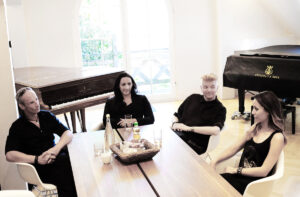
—Kai had the idea, he suggested Nicole, because the two of them had been hitting the clubs together for some time and she always sang to him during car rides – at least that’s how I understood it. In any case, she came to the audition and it was an instant fit!
—What influences did you have at the time?
—Our influences didn’t change that much during the years. We were and still are in this Darkwave and New Wave music that has socialized us. At the time of Drowing Voices I also listen a lot to so-called Indie Pop, which came up at the beginning of the 1990s and which combined melancholic words with jangling guitars. I always wanted to be signed by the British label Sarah Records 🙂
—The first song released by Derrière Le Miroir was “Simple Blue” in a compilation called German Mystic Sound Sampler Volume III. Can you please tell us more about this? I heard that the editor wanted you to change the name of the band.
—Easy Ettler, the editor of Zillo magazine, who released this compilation series, thought our name was pretty stupid. “No one can pronounce it” was his opinion and he really wanted us to change our name to Sirens Of Atlantis because he would have had a vision of that name when listening to “Simple Blue”. It has to be mentioned that Easy liked to smoke pot a lot. In the end, of course, we refused to change the name.
—At the beginning you were part of a label called Spirit, right? You played in a festival organized by them, didn’t you? That was the record of the band Umbra Et Imago, if I am not wrong.
—Yes, Spirit Records was run by Mozart, the head of Umbra Et Imago, and it distributed our first tapes. We played at the Spirit Festival in Jena/GER and also took part in a label compilation. But then we signed to a bigger record company that set up the sub-label Derrière Records especially for us, and the connections with Mozart in particular cooled down a lot.
—I thought that Derriere Records was your own label. Can you please tell us more about the big record company that started it?
—Derrière Records was established especially for us by a bigger record company called Session Music, itself a sub-label of WEA. It was run by the members of the Eurodance act Masterboy – which was quite funny.
—Alibis was your first album that it´s now 30 years old. Any special thing that you recorded from the days of the recording?
—It was very exciting, of course, because it was the first time we had spent a long time in a real studio. Fortunately, we had a nice sound engineer who supported us in finding our own sound. Even though he couldn’t really do anything with our music. In any case, we felt a bit like popstars then.
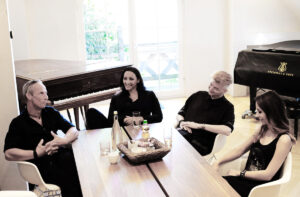 —In Deep, apart from the contribution of Astrid Reich in vocals, there is a great evolution. It’s difficult to imagine a track like Fancy Garden in the first album. It’s less raw, with more keyboards and more darkwave. Did you feel like doing something else as a musician? Did you think that you had grown up as musicians?
—In Deep, apart from the contribution of Astrid Reich in vocals, there is a great evolution. It’s difficult to imagine a track like Fancy Garden in the first album. It’s less raw, with more keyboards and more darkwave. Did you feel like doing something else as a musician? Did you think that you had grown up as musicians?
—We had more equipment and also took more time for the songs. Alibis came together pretty quickly and we thought we had to keep it as minimal as possible so we could do it live. With Deep we were a bit more relaxed and worked a lot with our new synth, the K-2000 from Kurzweil. The somewhat darker tones were quite intentional, as we wanted to sound a bit more serious (adult?) than on Alibis.
—In Thieves and Kisses the band moved in a more synth pop direction. Did you “plan” of these changes of style or was it something that was occurring in a natural way?
—We never have any plans 🙂 We just wanted to try different things. That’s why there is also a song in rhumba rhythm on the album. But it was a completely natural development. We had the songs and we thought about how we could best implement each one.
—What happened that the band stopped at the end of the beginning of the 2000? Was it due to the problems with the 4th album?
—For the fourth album we switched from Nightshade Records to Dion Fortune Records, but they’ve got some business problems, so the announced release date kept getting pushed back – until Dion Fortune announced it was going out of business. Curiously, that was also when we lost all our previous recordings in a hard disk crash. After that, we have lost our enthusiasm. So we disbanded D/L/M after we played a last gig in Chemnitz/GER in December 2002.
—What happened with the songs of that album that was lost? Did you reuse any of them?
—Only some demos have survived, but since I’m not a fan of recycling old songs, they lie unnoticed on some hard drive. E.g. for an I-M-R album I usually record between 30 and 40 demos and these ones, which don’t pass the final selection by the band, fall in oblivion.
—The three of you were together in a song of I-M-R called “Poisoned” Eyes released in the album Letters From the Paper Garden. How did you feel recording together?
—A bit nervous at the beginning but relaxed and satisfied at the end.
—After that, the band reunited for the birthday party of Kai’s son, right? Can you please tell us more about this? That’s quite unusual.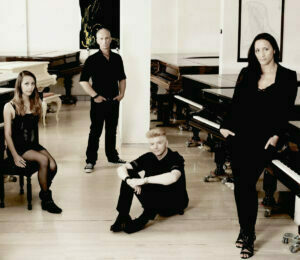
—It was some kind of a present because he likes our music. We played three songs and we were really surprised how much we could still remember.
—In 2014, the band appeared in Dead Wax Records’ Distant Waves. Did you realize that there was public that wanted to hear from you with that compilation?
—No, not at all. Of course, we knew that we are part of the 90ies Darkwave past, but such interest was a real surprise.
—In 2014, the band released a new single with two covers and the song Alibis live. In the past you had done another cover, “Nowhere Girl”. Why did you choose a song by Moby and another by Valerie Dore? What do you like of them?
—We wanted to do some unusual covers. Covering songs from the scene was too obvious for us. To be honest, I can’t remember why we chose Moby. But we just thought Valerie Dore was fun. There’s something about 80s Italo disco… 🙂
—In 2016, another Spanish label, in this case Oráculo released a compilation called A Handful of Memories with songs from the first three albums. How was this collaboration born? Did you choose the songs or was it Nico the one doing it?
—Nico asked us if we would be interested in such a compilation and of course we said yes. It was as simple as that. Nico chose the songs for it. And it was exciting for us to see which songs were preferred.
—After these years, the band came back with In Flux, an album, according to the band, about change. Is it about your changes as people in these years?
—We wanted some kind of concept for the album and the theme of “change” seemed very fitting. Not only we have changed in the 20 years, but also everything else. And that’s what it’s about: how to deal with changes or maybe even bring them about.
—Do you think that In Flux you have synthesized all the sounds of the band?
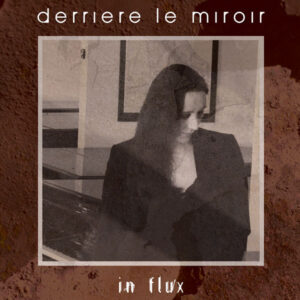 —Yes, we think so. It actually took a while to write the first song that really sounded like D/L/M. And we really made an effort to tie in with the past. But with modern means, of course.
—Yes, we think so. It actually took a while to write the first song that really sounded like D/L/M. And we really made an effort to tie in with the past. But with modern means, of course.
—Time for the side projects. Ralf you became part of In My Rosary when you were still in Drowing Voices in the Crowd. Was it difficult to be in so many different bands?
—Not musically, because I love writing songs and also love different styles, but humanly it was definitely difficult sometimes. Jealousy or envy was such an issue, especially when In My Rosary and D/L/M got their record deals some unpleasant discussions popped up within Drowing Voices. And Dirk, the lyricist of In My Rosary, kept talking at me that I was just wasting my time with Drowing Voices. As I said: quite unpleasant.
—What supposed the band In My Rosary to you? You have always been connected to the people of the band in your different projects.
—In My Rosary was the first project without a band context. There were only Dirk and me. So I could live my musical life without making any compromises. I just wrote songs, Dirk made new lyrics for them, I recorded and produced the songs and that was it. And later the live version was added with Martin von Arndt, Holger Diener and Hansi Huenig as live support – which was an enrichment. In this respect, it was truly the most important project for me. And concerning the people: I like working with people I know. Since I’m a really shy guy, it always took a while until I feel comfortable with someone. That’s why they’re always the first people I ask when something new comes up.
—You also were part of Griffin’s Fall another project with people of In My Rosary. The only album was released when In My Rosary was still active. How was born this collaboration with Martin von Arndt of Printed At Bismarck’s Death?
—Martin was working as a music journalist at the time and did a long interview with D/L/M. We found a spiritual closeness that led to the invitation to be a guest singer on the upcoming D/L/M album Deep. And that in turn was so much fun that we developed the idea for Griffin’s Fall directly in the studio. Since then, Martin and I have been close friends and he was also a reason why I started to perform live as In My Rosary back then. Without him as stage support it wouldn’t have worked out, because I didn’t feel like being on the road as a solo artist.
—Another project of yours was I-M-R. In the first album released by the continuation of In My Rosary, you have the collaboration of some great artists such as Isabelle Dekeyser from The Breath of Life, Elena Alice Fossi from Kirlian Camera and even the great Paul Roland. How did these collaborations were born?
—Just to mention it: after Dirk and I decided to drop In My Rosary, I asked Martin, Holger and Hansi, the In My Rosary live band, if they would like to continue the musical idea with me as a real band. And luckily they wanted to do it. That’s how I-M-R started.
After the release of the In My Rosary album Retro I really wanted to do something else. The production of the album was very exhausting, because the personal differences between Dirk and me had increased quite a bit. My idea was to record an EP under my other moniker Mary’s Comic with duets and for that I asked some artists I like. And fortunately, they all spontaneously agreed. However, when it became clear that In My Rosary could no longer continue in this form and I-M-R was founded, it became a whole album with some additional songs. Regarding Paul Roland: it looks like Paul and I will release an electronic album next year. If his Italian label agrees with it.
—Do you have any plans of releasing new material with IMR?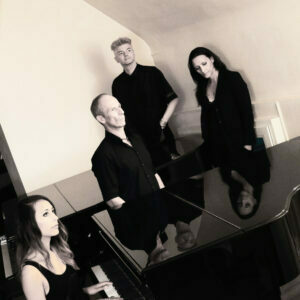
—In fact, we have a new album in the pipeline that we might release next year. But at the moment it’s still uncertain on which way it will happen, because our label lost its distributor and now we have to see how to resolve the whole thing. I would not like to change the label, because I feel very connected to Syborgmusic. That’s a kind of a dilemma. So let’s see…
—And about T-HE, what motivated you to reactivate this project? So far there is a digital single.
—It was just a onetime fun that developed while we were talking about a new Derrière album. We just liked the idea to dig up our school project again after such a long time. But there were no long-term goals. We just recorded whatever came to mind and our label later released those sessions digitally as two singles/EPs. That was it. There won’t be more.
—Helena, the new member of the band, is daughter of one of you, right? Is she also coming to Ombra? Is it easy to work with the family?
—Helena is Nicole’s daughter. And she’s not really part of the band. But she was an important guest on In Flux, so we thought it would be fair to have her also on the images. So she won’t come with us. Especially since she has just become a mother and now naturally has other priorities. But working with her was pure fun. Nicole and Helena really have a great relationship. So there were no problems at all.
—Are you going to release new material with Derrière Le Miroir?
—We are really thinking about it. Since playing live made so much fun until now, it gave us a motivations boost. I think I will start demoing some ideas next year – assuming I will have any, of course. And hopefully they will be good enough for another album.
—What can we expect of your set at Ombra? Are you going to play Alibis in its entirely as it’s the 30th anniversary?
—Except for one song (“Come”), we have all Alibis songs on our setlist. As well as some additional songs that were written around the time of Alibis. And we will play them as authentic as possible. So there will be a lot of vintage to hear. Both, song-wise and sound-wise. Maybe we can provoke some nostalgic sensations in one or another…



